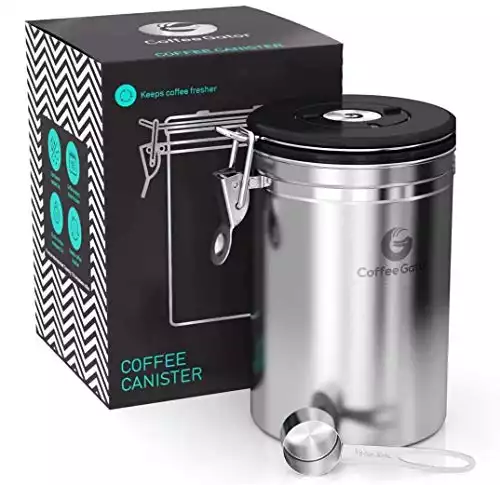How Long Do Coffee Beans Last?
Many people have a general idea of the answer to this question, but few actually know it. After all, how often do we worry about not finishing our coffee fast enough? Well, I’m always running out of coffee, so that doesn’t happen to me often!
But some people just don’t drink coffee as much. Maybe they’re caffeine sensitive, or they just aren’t that into it. So for whatever reason, their beans sit on their shelves for months on end.
For these people, it’s essential to know what the best practices are for storing coffee, to keep it as fresh as possible at all times. And when stored properly, just how long do coffee beans last?
Whole Beans Last Longer
You’ve probably heard this one before.
As soon as coffee beans finish roasting, they start a slow but continuous process called degassing. Here, the freshly roasted beans release carbon dioxide built up throughout the roasting process.
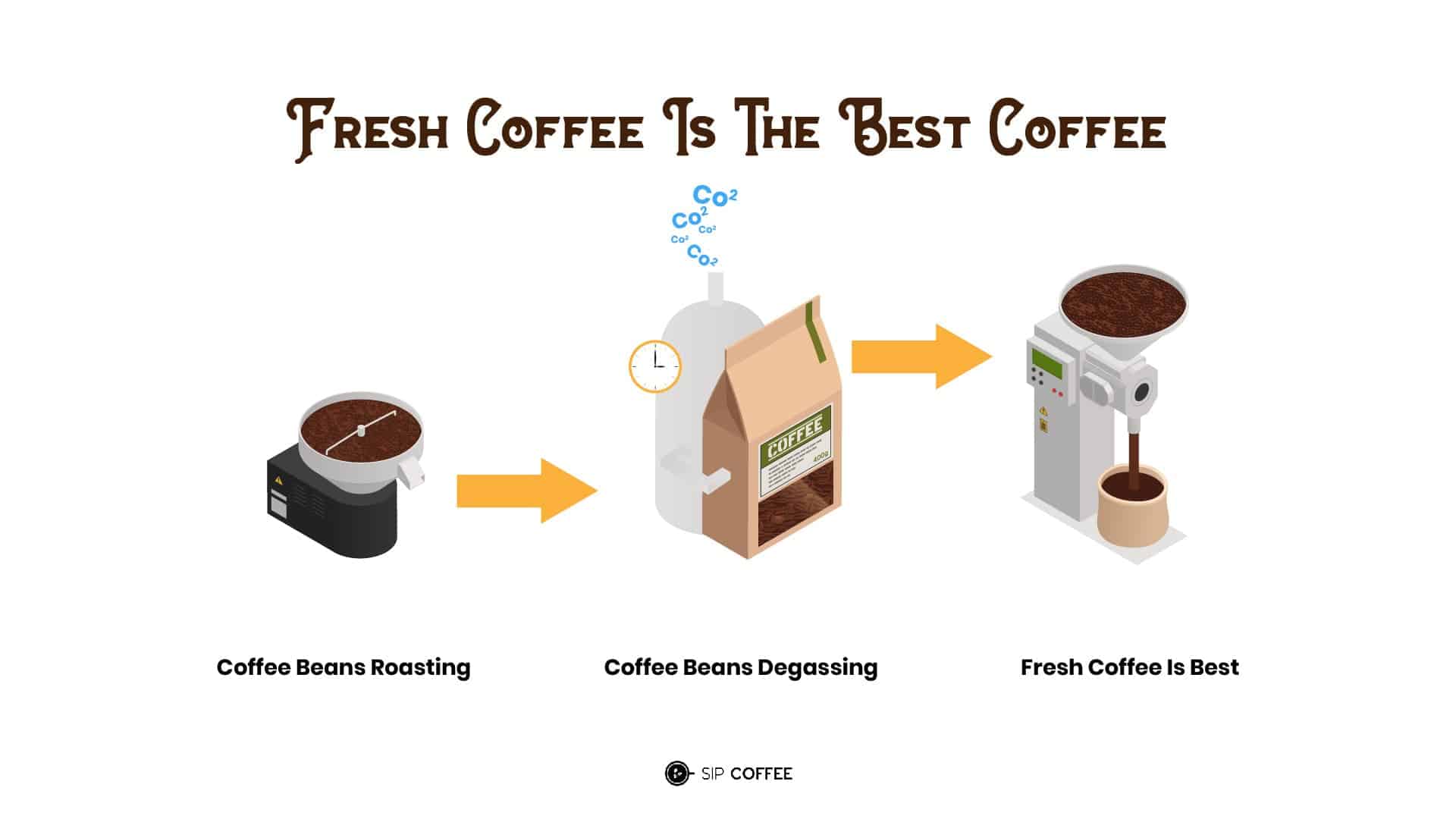
This is good for the first few days after roasting, as this is when much of the gases are released. Having too much carbon dioxide in the beans when you brew them can muddle up the flavors you get in your coffee.
Here’s the catch. When roasted beans have degassed too much, the flavors become much less pronounced. You eventually lose a lot of the aromas and subtle flavors along with the carbon dioxide, and your coffee starts to taste more stale than fresh.
Pre-grinding coffee before packaging speeds up this degassing process. Our knowledge about grind size tells us that grinding coffee increases the total surface area. During extraction, this exposes more coffee to water. But storing coffee beans also further exposes the ground coffee to its environment.
So the best way to make your beans last would be to grind them on your own! And note that the more recently they were roasted, the better. Just wait a few days for degassing to unveil the authentic flavor of your fresh coffee!
Vacuum-Packed Coffee Stays Fresher
Now, let’s talk about the storage of coffee. Large commercial brands like Lavazza add nitrogen gas to their packaging before vacuum-sealing it.
And how long do coffee beans last because of this process? Well, this extra step extends the shelf life of beans by weeks, even months!
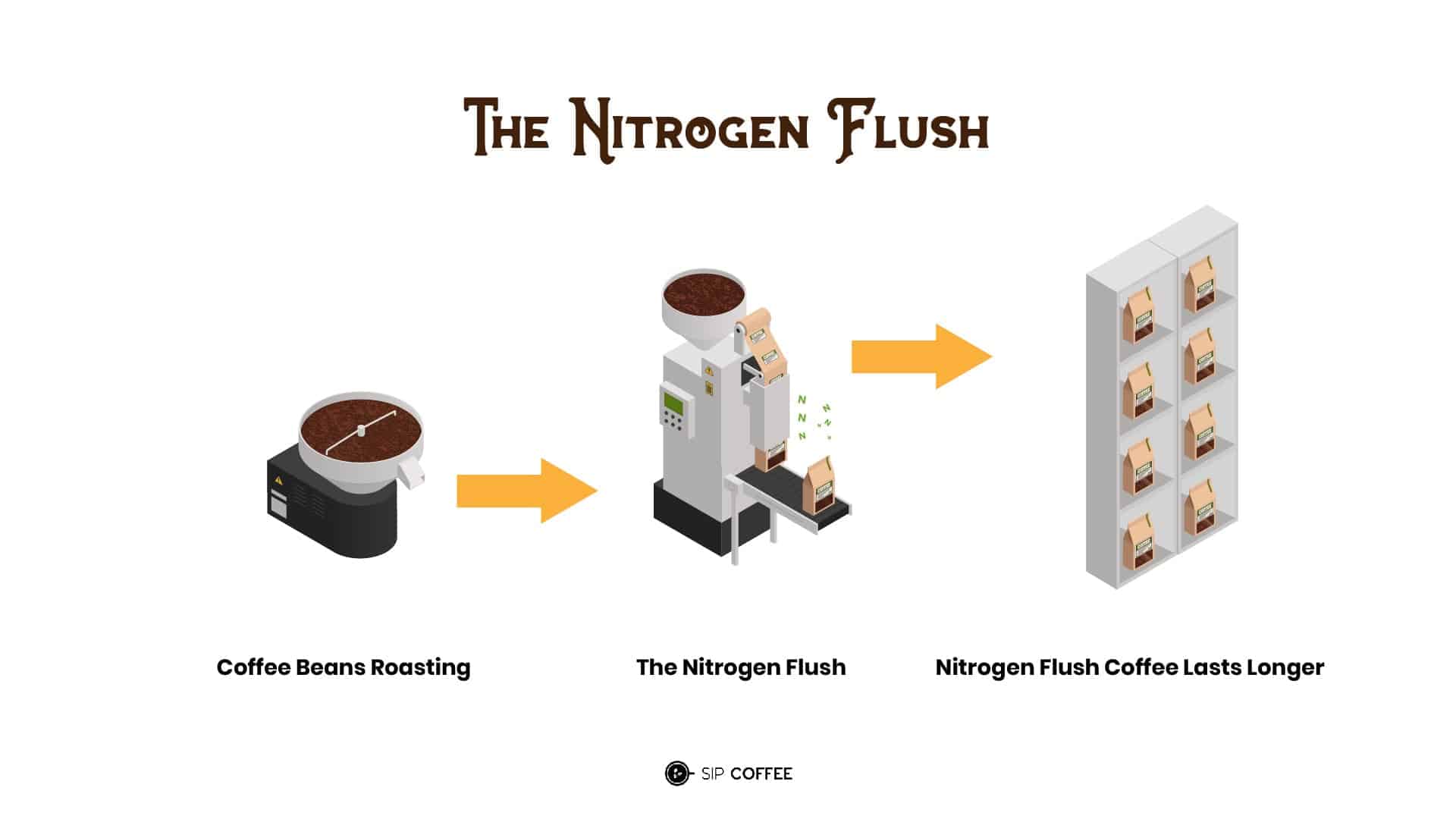
Adding nitrogen gas doesn’t prevent the degassing process from happening, though. So vacuum-sealing freshly roasted beans can cause your packaging to expand, and even explode!
So the caveat with vacuum packaging is that commercial brands have to let coffee sit for at least a few days before vacuum-sealing it in.
Commercial roasters send large quantities of their beans around the world at a time. And that doesn’t even include the time they’ll spend on a shelf in some supermarket! So the addition of nitrogen gas is to lessen the likelihood that the beans will go bad before they’re even sold.
If you don’t want to have to babysit your beans, and it usually takes you months to finish a single bag of coffee beans, vacuum-packed commercial coffee could be the way to go; especially if you’re flying with coffee. You can keep it fresh by storing it in a cool and dry place. And try to use the beans within 3 weeks after opening for optimal flavor!
Artisan Roasters Do Not Add A Nitrogen Flush
Like I said, nitrogen gas doesn’t prevent fresh coffee beans from degassing. So most artisan roasters decide not to add it to their packaging.
Instead, they sell their fresh beans in kilogram-bags with one-way valves. This allows their coffee to naturally but slowly degas over time. Not to mention, they also let you get a whiff of your beans before buying them!
In terms of shelf life, these artisanal coffee beans last for a shorter time than vacuum-sealed commercial coffee. But small-time roasters can afford to roast on demand. And that’s a luxury of time that commercial roasters don’t have. So, they can control how soon after they roast their coffee will reach their customers!
If you want to get the optimal taste and aroma from your coffee, buying freshly roasted artisan coffee would your best option. In that case, you’ll ideally want to use your beans within 10 to 12 days from opening for optimal flavor.
Once your coffee’s been degassing for around a week, you can also invest in your own vacuum-sealed container and store it there. That, and storing your beans in a dry location will help your coffee beans last for a very long time.
Ground Coffee Diminishes Quickly
I mentioned above that pre-ground beans degas a lot faster than whole beans do. Because of this, whole coffee beans last much longer than pre-ground coffee.
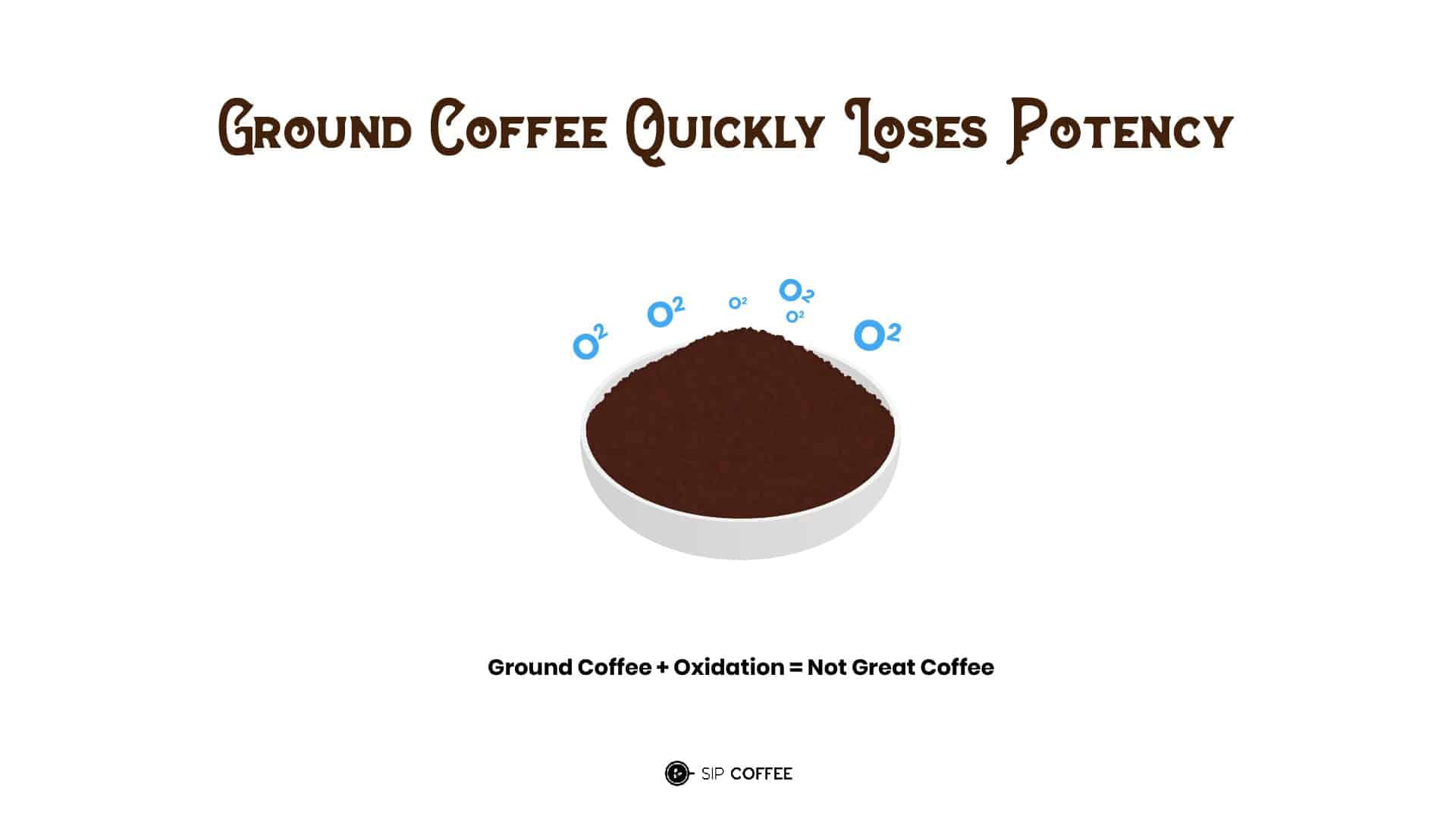
If you do decide to buy pre-ground coffee, make sure to seal it in a vacuum-sealed container and store it in a cool, dry place.
But even then, there’s no denying the world of difference between whole and pre-ground beans. If you drink coffee every day, you’ll definitely notice the flavor (or lack thereof) of stored, pre-ground beans.
Compared to whole coffee beans, pre-ground coffee comes across as flat, with a dull flavor profile. When coffee is roasted, left to sit, and then pre-ground, it loses a lot of the subtle flavors and aroma that add to its complexity.
If your grounds are too far gone to brew with, check out our post on what to do with old coffee.
What About Brewed Coffee?
This isn’t really talked about a lot because many people’s problem is that they can’t stop drinking coffee! But let’s say you made too much and have some leftover in your carafe. How long does coffee last when you’ve already brewed it?
With many coffee machines using thermal carafes now, a pot of coffee can stay fresh for around 5 to 6 hours.
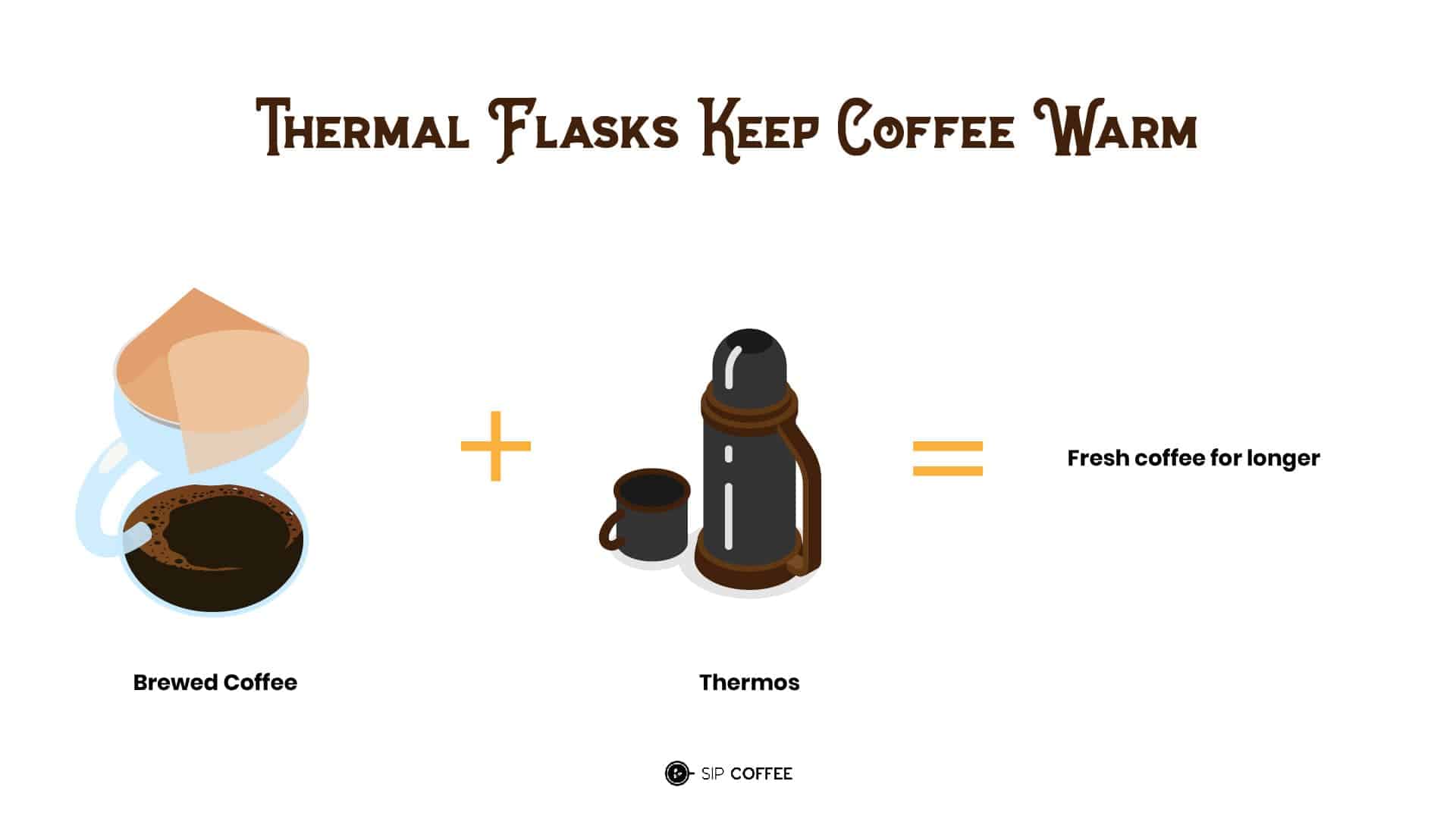
But if you’re using a full immersion brewing method like the French press, you’ll want to transfer the coffee to another container before going about your business. Otherwise, you run the risk of terribly over extracting your coffee! It can come out super bitter and astringent because of this.
You can still drink coffee even after the 5 to 6-hour period, as it will take much longer than that for coffee actually to spoil. But obviously, it won’t taste as delicious or as fresh anymore.
If you’re guilty of doing that, though, don’t worry. I do it too! It’s always difficult to let good coffee go to waste, even when it’s old.
Reheating Coffee
Say it with me: microwaves were invented for this very purpose! I have a friend who prefers reheating old coffee instead of brewing a new batch. And to that, I say, whatever floats your boat. There are two baristas in my household, and we still do it sometimes!
But even though it’s possible, it doesn’t correctly work like a reset button. It certainly won’t make your coffee taste freshly brewed again. Reheating coffee reorganizes the chemicals in it, so the flavor profile gets all muddled up.
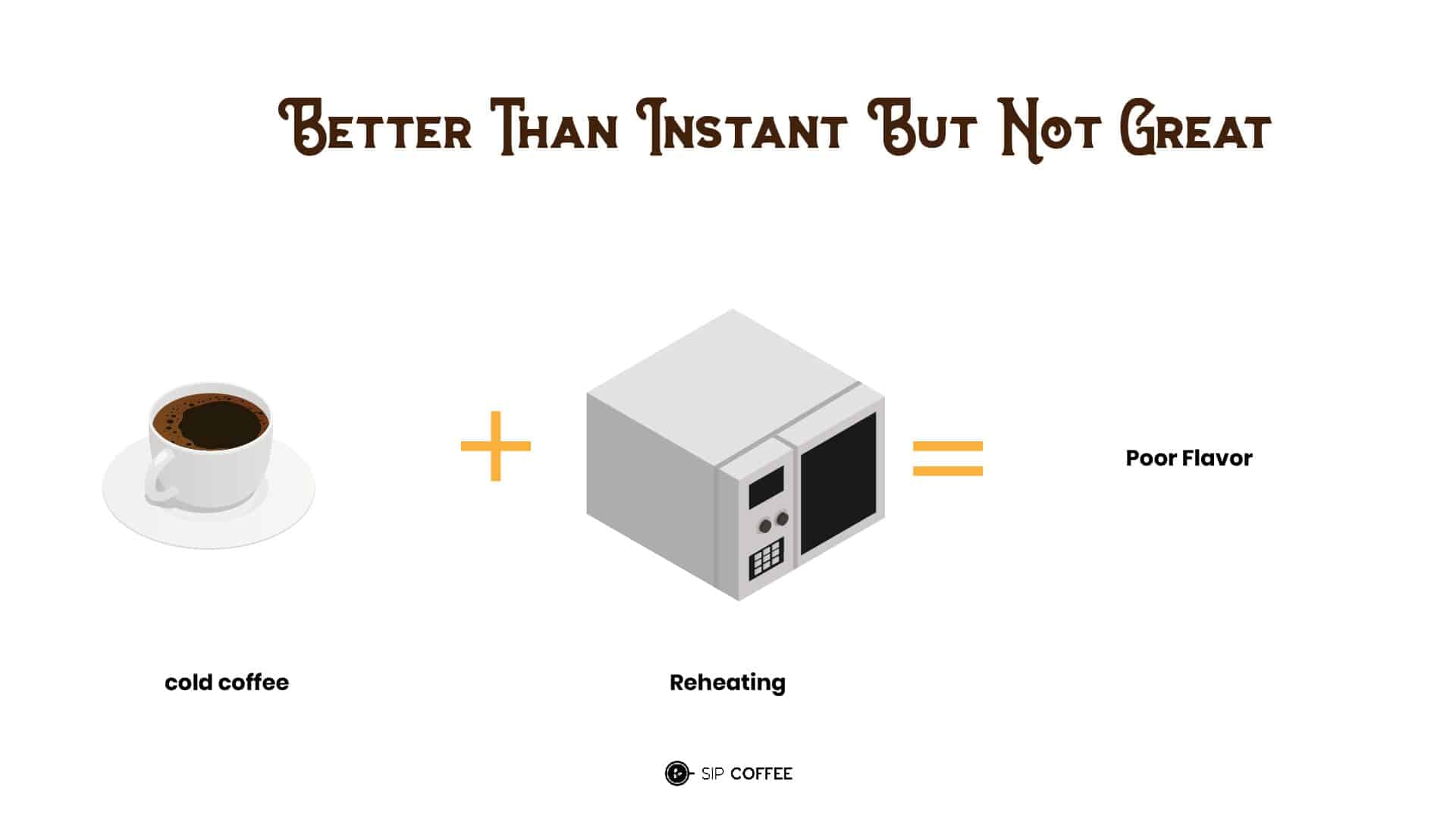
It’s the coffee version of reheating fried chicken. You can reheat it well, but it will still be unremarkable compared to when you first made it.
Instead of reheating, we’d suggest investing in your own thermos instead!
There are thermal containers available these days that can keep coffee hot for up to 12 hours. If you like making one big batch and drinking it throughout the day, this is a way you can prolong the freshness of your brew.
Unroasted Green Beans Can Last For Years
Another option you have is to buy unroasted green beans.
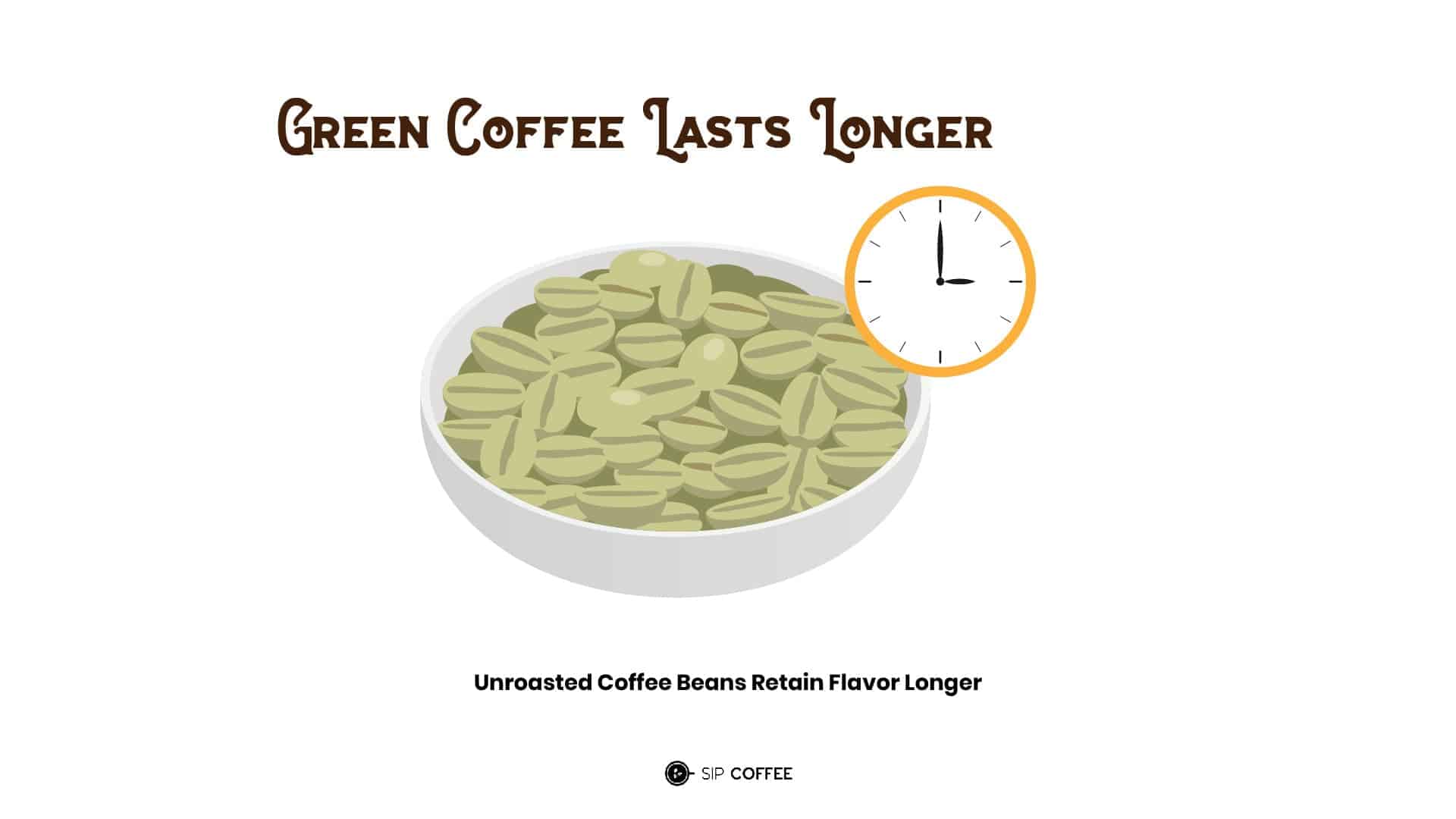
So how long do green coffee beans last? Just store them similarly to roasted beans (in a vacuum-sealed container), and they can retain their full flavor profile even after 1 year of storage. They’ll also retain most of their natural flavor profile after up to 3 years!
Buying your beans unroasted requires extra work, though, as you’ll have to roast them yourself. Home-roasting is a tedious process. But I promise you, it’s a gratifying hobby!
Expect the way you take your coffee to change. You might have to plan your cups of coffee a few days in advance to give your beans time to degas. And drinking a delicious of cup of coffee from beans you roasted yourself is just a different kind of rewarding.
Has Your Coffee Expired?
Coffee is a food product. And just because it typically has a long shelf life, doesn’t mean it will keep forever.
Over time, the beans will become exposed to their surroundings. Oxidation and moisture in the air can break down the chemical compounds in your coffee. This can result in your coffee turning rancid and quite difficult to drink.
But there are two ways for you to tell that your coffee has expired, without having to put it in your mouth.
One sign that your coffee has expired is when it is no longer fragrant. When your coffee’s aroma is barely noticeable, it’s a sign that you won’t be getting much out of your beans anymore.
Another thing you might notice with expired beans is the presence of mildew or mold. If you see anything that resembles these on your coffee beans, that means they’ve already lived out their useful life.
But even before any of these signs occur, you might be noticing that your coffee hasn’t been hitting the spot like it used to. And no matter what you adjust in your brew, it just won’t give you a decent cup anymore. This could also be a sign that your beans won’t last long anymore, and you should consider just doing away with them.
Preserving Coffee
So how can you ensure that every cup of coffee you make is as fresh as possible?
First, only grind the amount of fresh coffee you plan to drink. This way, you don’t have leftover grounds that you have to store. You won’t feel guilty for throwing away leftover coffee, and you don’t have to reheat old coffee just to get your money’s worth either.
If you usually struggle with preparing an exact amount of coffee it might be worth it for you to invest in your own coffee scale. You’ll be able to measure out exactly how much coffee you need, and minimize your wastage too!
Freezing Coffee
Another way people preserve coffee is by freezing it. While it isn’t exactly common practice, it’s not necessarily bad for your beans – except one crucial caveat. Coffee stored in a freezer will also lose its own flavors in the process, and as a result, it won’t taste as it once did when brewed.
We don’t see the point in freezing coffee, just because the risks on impacting flavor far outweigh the actual benefits. You can store coffee in an airtight container inside a dry place, and it will still last a very long time.
Besides, you’re meant to drink coffee. You get nothing by preserving it as long as you can. So just store it properly, and brew brew brew!
Frequently Asked Questions (FAQ)
How Long Do Coffee Beans Stay Fresh?
Coffee beans stay fresh for around 3 months after roasting given they are stored in an airtight container away from light.
On the other hand, ground coffee loses its freshness much quicker as it is subject to oxidation as soon as it turns into grounds.
Interestingly, unroasted green coffee beans can maintain their shelf life for unto 2 years.
Can Old Coffee Beans Make You Sick?
While old coffee beans won’t make you sick and are safe to brew with, they won’t taste great.
On the flip side, it’s possible to rejuvenate old beans by using them in a cold brew. Yup! Try it, and thank us later!
Can You Brew Freshly Roasted Coffee?
Yes, but it’s best not to. You should typically allow your freshly roasted coffee to degas for 3 to 4 days before brewing them.
An excess of carbon dioxide is present in your beans right after roasting, and this can muddle up the flavors in your cup of Joe if you brew them right away
Does Instant Coffee Go Bad?
When you store it in an airtight container, and inside a dry place, the shelf life of instant coffee can span decades.
However, we still wouldn’t recommend choosing this over fresh coffee. Not only does brewed coffee taste better, but it’s also naturally healthier and contains more caffeine!

